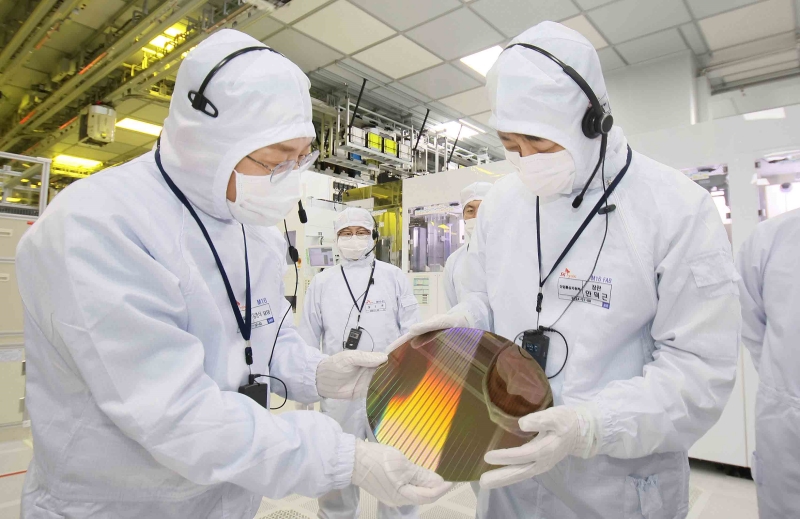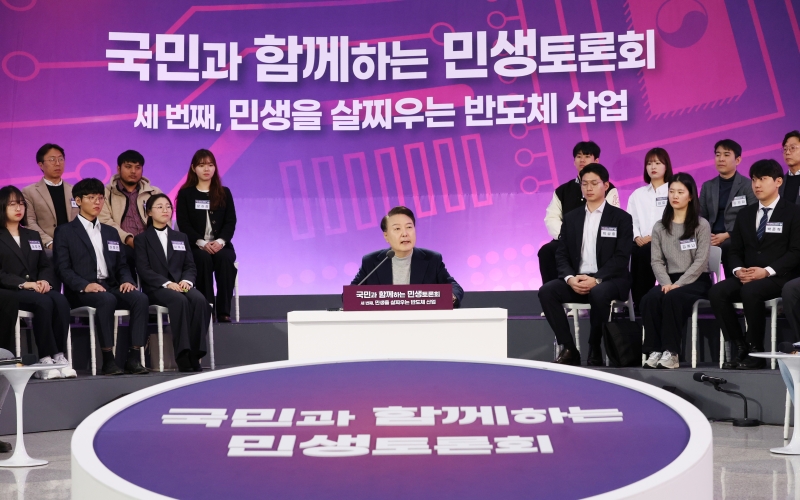
Minister of Trade, Industry and Energy Ahn Dukgeun (right) on Jan. 11 examines the semiconductor production line at SK Hynix's plant in Icheon, Gyeonggi-do Province. (Ministry of Trade, Industry and Energy)
By Park Hye Ri
The country will build by 2047 the world's largest semiconductor cluster in Gyeonggi-do Province.
The Ministry of Trade, Industry and Energy and Ministry of Science and ICT on Jan. 15 released their plan for this at a policy debate under the theme "Semiconductor Industry for Enriching Public Livelihood." President Yoon Suk Yeol chaired the event held at the Natural Sciences Campus of Sungkyunkwan University in Suwon, Gyeonggi-do.
The envisioned mega-cluster will cover cities in the province packed with semiconductor companies and institutions: Pyeongtaek, Hwaseong, Yongin, Icheon, Anseong, Seongnam and its district of Pangyo New Town, and Suwon.
The report said the facility by 2047 will have 13 production and three R&D fabs added to its existing lineup of 19 production and two R&D fabs through private investment from Samsung Electronics and SK Hynix worth a combined KRW 622 trillion. The plan is to complete three production and two R&D fabs first by 2027.
Another goal is to have the world's largest monthly output of 7.7 million wafers by 2030 at a production site spanning a massive 21 square km.
Construction of the cluster's facilities, the government said, will lead to the joint growth of the related ecosystem such as for makers of materials, parts and equipment and fabless companies. The expected results are a production-generating effect of KRW 650 trillion and direct and indirect creation of 3.46 million jobs.
To create the proper environment for infrastructure and investment in chip production, public support will also ensure no disruptions to electrical power and water supply and the active use of expedited processing systems in use like a permit timeout policy for rapid processing of infrastructure-related permits.
The semiconductor budget of KRW 1.3 trillion is double that of the previous year and "killer regulations" for semiconductors will be lifted through the National High-Tech Strategic Industries Committee chaired by the prime minister.
The science card visa will be improved and extended from one year to a maximum of 10 to attract global talent. Stimulation of exchange of cutting-edge technology and personnel will allow the dispatch of domestic researchers to R&D institutes abroad.

President Yoon Suk Yeol (center) on Jan. 15 speaks at a policy debate under the theme "Semiconductor Industry for Enriching Public Livelihood" at the Natural Sciences Campus of Sungkyunkwan University in Suwon, Gyeonggi-do Province. (Yonhap News)
President Yoon said at the debate, "Semiconductors enrich the people's livelihoods more than any sector and create many quality jobs," adding, "Chips are a strategic industry that succeeds only if the country invests all of its human and material resources into it."
He added his intent to extend tax credits for semiconductors expiring this year and his strong support for the industry by reinforcing diplomatic ties with allies and friendly countries.
hrhr@korea.kr